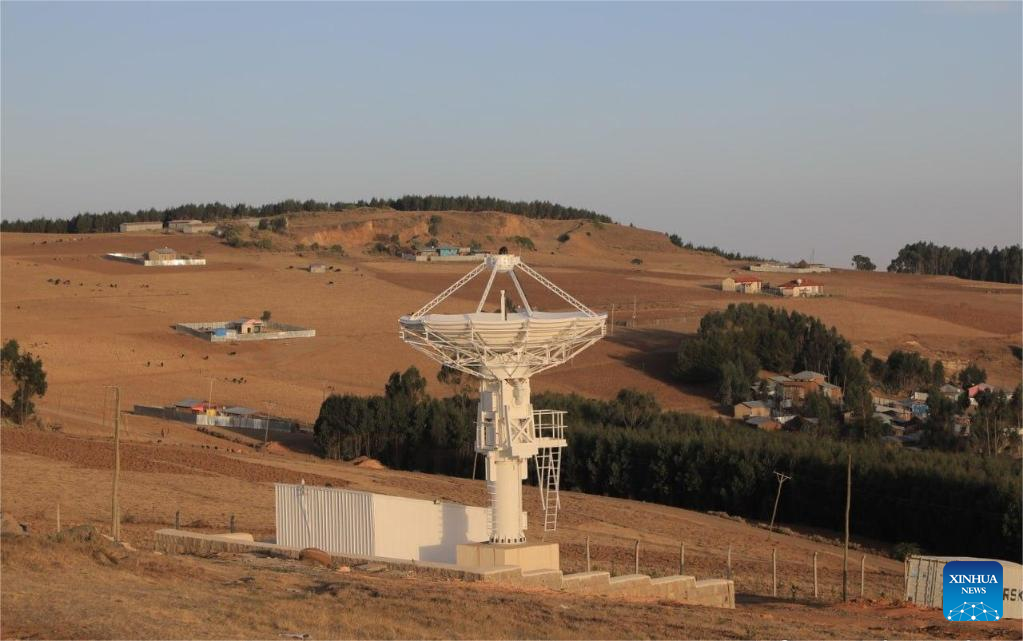Published: March 09,2024

This undated photo shows the Chinese-built ground station at the Entoto Observatory and Space Science Research Center in Addis Ababa, capital of Ethiopia. (Ethiopian Space Science and Geospatial Institute/Handout via Xinhua)
The Ethiopian Space Science and Geospatial Institute (SSGI) has launched a “Ground Station as a Service” initiative, involving the reception of satellite data for different countries, organizations and users, an official said.
Melaku Muka, director of satellite operations at SSGI, said that the institute has begun generating revenue through receiving satellite data, processing and analyzing them for various organizations and countries on a payment basis. The Chinese-built ground station at the Entoto Observatory and Space Science Research Center in Addis Ababa is at the core of this initiative, capable of receiving high-quality satellite data.
“The institute has begun providing full-fledged ground station services, including satellite communication, data reception and processing, and up-linking those data to clients,” Muka said in an interview with Xinhua in Addis Ababa, the capital of Ethiopia.
The launch of the initiative signifies Ethiopia’s strides to join the global satellite data market and helps the East African country earn revenue from the sector.
The payment modality for the service is arranged based on the amount of time spent per pass or minute used by the data reception station. According to the director, organizations that do not have ground stations due to limited budgets, satellite operators that require frequent communication and reception of data, and research institutions are taking advantage of the institute’s “Ground Station as a Service” arrangement.
“Instead of building their own ground stations, users can access cost-effective data center services by paying only for the time slots they utilize,” the director said, indicating that the arrangement allows entities to access global satellite data without incurring high costs.
In December 2019, Ethiopia launched its first-ever satellite, abbreviated as ETRSS-1, into space from China. The command and control center is located on the 3,200-meter-high hill of Entoto, a mountainous area on the outskirts of Addis Ababa.
Noting that cooperation between China and Ethiopia in space science technology has strengthened over time, Muka said China’s role in helping Ethiopia launch its first satellite was “remarkable.”
“In May 2021, Ethiopia launched a 7.3 meters multi-satellite receiving ground station. Using this ground station, we have been receiving high-resolution satellite images with different domains,” he said, recalling that a Chinese company built the “state-of-the-art” ground station at Entoto.
Appreciating the successful capacity building, technology, and knowledge transfer from Chinese space science experts, Muka said Ethiopian professionals are now able to independently manage the entire satellite operations and provide valuable data for end-users.
“The Chinese help was very profound, particularly when Ethiopia launched its first satellite into space from China,” the director said.
This undated photo shows the Chinese-built ground station at the Entoto Observatory and Space Science Research Center in Addis Ababa, capital of Ethiopia. (Ethiopian Space Science and Geospatial Institute/Handout via Xinhua)
Melaku Muka, director of satellite operations at the Ethiopian Space Science and Geospatial Institute, speaks in an interview with Xinhua on March 1, 2024, in Addis Ababa, the capital of Ethiopia. (Xinhua/Liu Fangqiang)
Xinhua
 Africa -China Review Africa -China Cooperation and Transformation
Africa -China Review Africa -China Cooperation and Transformation
